- Home
- Nevil Shute
Marazan Page 2
Marazan Read online
Page 2
I can’t say that I have a very clear recollection of what happened during the next ten minutes. I was conscious for most of the time, I think, but my memory of the incidents has become blurred with pain. I wasn’t strapped in, and as she went over I grabbed at my seat to prevent myself from being thrown out. As it was, I was chucked half out of the cockpit and crashed my head down on to the padded edge of the instrument board. Then the machine turned right over on her back, and the ground came up and pushed me back into the cockpit again upside-down. I remember a keen, agonising pain in my neck, and then I think I went off for a little. Very likely I was stunned.
I came to myself pretty soon, however. Petrol was running over the seat of my trousers and soaking through my clothes up to my waist; I think it was the cold of it that revived me. I was crammed into the cockpit upside-down, with my shoulders in the grass; I was pretty far gone, I suppose. I remember wondering how soon it would be before anyone found the machine, or if anyone had seen us come down. I knew that I wasn’t going to last long in that position.
It was evident that if I was to get out I must act quickly, before I became unconscious again. I could feel the weight of the machine pressing me down into the grass. I got one arm free above my head, summoned all my energy, and with a violent heave managed to lift the machine a little. The movement dislodged my weight; my legs fell down in the cockpit and my body shifted sideways; the machine lurched a little and collapsed on to me again, pinning me in the cockpit.
Then I got my feet drawn up against the floor of the cockpit and tried to raise the machine that way. Again I raised her a little, and again she seemed to hesitate, swung, and collapsed on me again.
That was my last effort. In the new position I could not use either hand to free myself; if I had had the full use of my hands, though, I doubt if I could have got out. The thundering in my head grew terrific.
That, so far as I was concerned, was the end.
I think it was the pain in my neck that roused me again, that and the change of position as I rolled out of the cockpit on to the grass like a hermit crab when you touch the end of his shell with a cigarette. Somebody had lifted the tail of the machine and, there being nothing to hold me in the cockpit, I had tumbled out on to the grass. I lay where I had rolled; I couldn’t move, and at first I couldn’t see. Then I began to pick up my surroundings, the woods and the hurrying clouds racing past above. At last somebody came and rolled me over and unfastened my helmet and my collar, and began feeling me all over for broken bones.
Finally, I sat up and discovered that apart from the necessity of holding my head on with both hands I had come out of it with very little damage. I tried to get up without letting go of my head, and started falling about like a puppy.
‘I’d take it easily for a bit if I were you,’ said somebody.
I turned painfully towards the voice. ‘I must have done it a bit of no good,’ I said vaguely. ‘Is the machine a write-off?’ And then I managed to look at him.
‘Good God!’ I said weakly.
He wasn’t a bad-looking fellow but for his clothes; a slight, dark-haired man of about my own age. As for the clothes, I’ve never happened to wear them myself because—for some obscure social reason—when I did my month it was in the second division.
I never really regretted that month. For one thing, the importance of a term of imprisonment depends entirely on the circle in which one moves, and my circle was never exalted. Moreover, I think it was worth it. It came as the result of a very pleasant little evening after a show at one of those places in Jermyn Street; there were about half a dozen of us there, all pilots. It was one of the best little suppers I’ve ever been at. Everyone was comfortably full but nobody made a pig of himself; it was funny without being vulgar, and this much I can truthfully say, that none of the girls went home next morning any worse than when they came.
At about two in the morning Maddison and I got restive; it seemed to us that an obstacle race in cars would provide a little excitement for the ladies. His car was some old racing chassis into which he had fitted a three-hundred-horse-power German Maybach that he had snaffled off some aeronautical scrap-heap, and he was very proud of it. Mine was nothing like that, but I was pretty sure that I could give him fits when it came to dodging round the lamp-posts. So we started from Jermyn Street.
I’ll admit that we were pretty far gone, because I can’t remember that we even fixed up a course to race. I had one of the Flossies with me in my two-seater. I forget her name, but she had a bag of oranges in her lap, and whenever she saw a pretty lady she threw an orange at her—whether from fellow-feeling or superiority I was unable to determine. For myself, I was very happy. I had one fixed idea running in my head: that I must on no account run over anyone, because then, as I explained to the Flossie as we shot down Haymarket, I should not only be drunk in charge of a motor-car, but drunk in charge of a manslaughter. I remember impressing on her that this was an epigram.
I am a little hazy as to exactly where we went. I remember a furious game of touch-last at the bottom of Whitehall which had to be abandoned for fear of running over the policemen who were trying to get on our running-boards, and I remember telling the Flossie as much as I could recollect of the Secret History of the Court of Berlin as we went round and round the Queen Victoria Memorial in front of Buckingham Palace. I think we got into Piccadilly by St. James’s Street, because it was in Air Street that we met our doom. I spun in here to get to Regent Street, meaning to go up and have a look at Madame Tussaud’s. But there was a taxi in Air Street that impeded my cornering; I did the best I could, braked heavily, ran up on to the pavement, and impinged upon a lamp-post. Maddison, following close behind me, ran into my stern and—there the police found us.
I am not very clear about the proceedings at Vine Street. I imagine they were purely formal; I know they let the Flossies go after a bit, but Maddison and me they popped into the cells for the night. I decided then that it was time I pulled myself together; a little cold water and a cup of black coffee that they got me made a new man of me, and by the end of half an hour I had decided that my best line was to plead guilty. Maddison was worse than I. I could hear him in the next cell entertaining with song a small, discreet audience of constables in the passage. He was telling them all about the Yogo Pogo, I think, and I remember that he was particularly insistent on the fact that
‘The Lord Mayor of London,
The Lord Mayor of London,
The Lord Mayor of London wants to put him in the Lord Mayor’s Show.’
Since then I have often wondered about the Yogo Pogo, but I never learned any more. For myself, I went to bed and slept soundly till they came to call me.
Now the sequel to this had certain elements of humour. I hadn’t a chance to speak to Maddison till they stood us up together in court. The magistrate asked me first what I pleaded, and I said that I pleaded guilty and would accept the findings of the court.
Maddison kicked me on the shins, pleaded not guilty asked for a remand, and was taken away.
A policeman got up and said that my car mounted the pavement. Apparently that set the fashion, because in a minute everyone was saying that my car had mounted the pavement. It was evidently a far graver offence to mount the pavement than to run into the taxi. In fact, that was about all the evidence there was. In extenuation I said that I might have been a little excited, but I was very far from being incapable of driving a motor-car. I pointed out that I hadn’t endangered anyone but myself. The magistrate said I had endangered the policemen who were trying to get on my running-board. I said that wasn’t my fault, and got sternly rebuked. Then they asked me how much I had had to drink. I asked: Since when? and that didn’t do me any good. They said, since six o’clock the evening before. I could see that it was hopeless by that time, so I gave them the account in chronological order so far as I could remember—two cocktails, half a bottle of sherry, about a third of a magnum, a glass of port, six whiskies (during the intervals of th
e theatre), another half-bottle of champagne (at supper), and after supper a few more whiskies. That finished it. The magistrate told me that he greatly regretted that his powers were limited to a sentence of one month in the second division, and they took me away to Brixton.
Maddison, on the other hand, retained Eminent Counsel for his defence at a perfectly incredible fee, and got off. Maddison was never very bright at the best of times. With a touching faith in the integrity of the Law he paid Eminent Counsel to get him off and gave him a free hand. The result was perfectly appalling. Eminent Counsel started away back in 1915 and took the court through every little crash Maddison had had in ten years’ flying. He must have been a pretty dud pupil; we heard that he wrote off two machines in 1915, three in 1916, and two more later in the war. Eminent Counsel was a little hard up for post-war crashes to account for Maddison’s mental state, but he made such play with the material at his disposal that by the time he’d finished Maddison was a clear case for detention during His Majesty’s pleasure and the Bench were inquiring how it was that the prisoner was apparently licensed to carry passengers in aeroplanes for hire or reward. At that point Eminent Counsel began to hedge a little. Maddison got off, but the evening papers made such play with him that the Air Ministry had to cancel his licence. That was a pity, because he was quite a good pilot.
The Air Ministry had a smack at me when I came out, but nothing like such a hard smack as that. The firm looked a bit old-fashioned at me, too; I didn’t really blame them. They were all good sorts, though, and I think each of them felt secretly that it was up to somebody who had never happened to be drunk in charge of a motor-car to cast the first stone. In a month it had all blown over.
But all this is a digression. I sat on the ground in the rain for a bit and looked at the convict, and the convict looked at me.
‘What the devil are you doing here?’ I said.
I noticed that he was keeping his eyes open for anyone that might be coming to have a look at the machine. He didn’t seem to have heard me; I spoke to him again.
‘What are you doing here?’ I said.
He looked down at me as I sat on the ground, and smiled at me vaguely.
‘What a damn silly question!’ he said gently. ‘I’m looking for the Philosopher’s Stone; or—the Tree of Knowledge. One should have learned the difference between Good and Evil by this time, though, don’t you think?’ His voice drifted away into silence. ‘But I doubt if it grows in this wood.…’ He roused himself. ‘I don’t think you’re much hurt.’
I blinked at him. ‘You’d better get back into that wood and go on looking for it, pretty damn quick,’ I said. ‘There’ll be people here in a minute.’ It was a wonder the crowd had not arrived already.
He nodded. ‘Perhaps that would be wisest,’ he said reflectively. I noticed that he spoke like an educated man. ‘Are you sure you’ll be all right now? That’s good.’ He moved towards the trees.
‘Half a minute,’ I said weakly. ‘What about you?’ I tried painfully hard to collect my wits. ‘Do you want any help—is there anything I can do?’
He asked me if I meant it.
There was a sort of wheel and ratchet going round inside my head and I was feeling very sick. I wasn’t at all sure that I did mean it; at the moment I hadn’t enough go left in me to pull a sprat off a gridiron. I climbed slowly to my feet and stood there swaying gently in the breeze; he ran up and caught hold of my arm to steady me.
My head began to clear a little. ‘Of course I mean it,’ I muttered. ‘One thing I … one thing. What did they get you for?’
He looked at me in a way that made me feel pretty rotten for having asked.
‘Embezzlement,’ he said shortly.
I planted my feet farther apart on the grass and found it an assistance. ‘Well, that’s a good clean sort of crime,’ I said vaguely. ‘So long as it wasn’t anything to do with dope or children.…’ I pulled myself up; I was beginning to ramble.
But he looked at me curiously. ‘You don’t like dope?’ he said.
I made an effort and pulled myself together a little. ‘Get back into the hedge and don’t stand talking in the middle of this field like a ruddy fool,’ I said. He scuttled back to the edge of the wood. ‘Now see here,’ I said, ‘I’ll do whatever I can to help you get away. I owe you that. What is it you want—food and clothes? Do you want to get out of England?’
He looked at me suspiciously. ‘You’re not going to give me up?’
I told him to talk sense. ‘For one thing,’ I said, ‘I could give you away now without bothering to get you into a trap, simply by going away and telling people that I’d seen you here. But here I am. I’ll do what I can for you if you’ll let me, or if you don’t want any help I’ll go away and forget I’ve seen you. Now that’s square.’
He motioned to me to come close; he seemed suddenly afraid. ‘It’s most frightfully good of you,’ he said, ‘and I do want a bit of help. It’s a thing that you can do quite easily, without any risk to yourself. There’s a house about four miles from here on the other side of Stokenchurch. The house is called Six Firs. It’s not my home—I daren’t go near home. They’ll be on the look-out for me there. But there’s a cousin of mine lives with her people in this house—a girl, oh, a damn good sort. She’ll fix me up if she knows I’m here. Go to the house and get hold of her, and tell her. Don’t let her people know—they’re too old. Tell her I’ll be outside the house from eleven o’clock onwards. Tell her to leave the morning-room window open and to switch on the light in her bedroom when it’s safe for me to come in.’
‘She won’t believe me if I go and tell her that,’ I said. ‘No girl would. She’d think I was trying it on.’
He gripped me by the arm. ‘You’ve got to make her believe,’ he said. ‘You’ve got to—you simply must. I must see her—she may have heard—she may know something. Man, I tell you, I’ve got to be free for the next ten days. After that.… But she may know what’s happening.’
He was becoming rapidly incoherent. I freed myself gently from his grip on my arm.
‘I’ll do the best I can,’ I said. ‘Six Firs, at eleven o’clock, with a light in her bedroom window. By the way, what’s her name?’
‘Stevenson,’ he said, ‘Joan Stevenson. My name is Compton.’
‘Right you are,’ I said. ‘I’ll go there and do the best I can. And see here—if I can’t convince her I’ll be near the gate myself at eleven o’clock to-night. Now you’d better cut off into cover.’
He turned and ran into the wood through the trees till he was out of sight. I noticed that he ran with a limp.
Well, there I was—and the devil of a fine position to be in, too. I turned and walked unsteadily towards the machine. She was in a shocking mess. I looked first at the engine. One of the connecting-rods had poked its way through the side of the crank-case and made a hole big enough to put my head into; through the hole one could see the mincemeat inside. I judged the machine to be a complete write-off; the port wings crumpled up and the fuselage badly injured close behind the engine. It was the worst crash I had had since the war.
I stood looking at it all for a minute, and it struck me that I was very lucky to have got out of it alive. It was now a quarter of an hour or more since it had happened, and nobody had arrived in the field. And then I thought that if Compton had not turned up I should still have been in the machine, pinned upside down, unconscious and dying—if not already dead. The thought of it fairly made me sweat with fright.
I was feeling much better by now. My neck had had a beastly wrench, but I could walk without holding on to it, and apart from that I was hardly hurt. I left the machine and began to walk along the edge of the wood in the direction of Stokenchurch. In all the half-mile that I walked through the fields to the road I never saw a soul. It was evident that nobody had seen me come down; that wasn’t difficult to understand, because it was a brute of an evening and I had been flying very low above the trees, half hidden in the clouds. A
s I went on through the fields and met nobody I realised that I owed my life to this fellow Compton. I don’t imagine that my life is worth much or that I’ve ever done much good with it; at the same time—it’s all one has. And then as I walked on I knew that it was up to me to see this business through to the end and to back Compton in every way I could—even if it were to mean another spell in quod for me. Looking back now over the years I’m glad to be able to remember that I stuck to that decision, and backed him till he had no further need of me.
I went on, and presently I came to a road. A little way along it I met a Ford van delivering groceries to some outlying village. I stopped it and asked the boy for a lift in to Stokenchurch. He stammered and looked at me as if I was a ghost, said something in refusal, and tried to drive on. I jumped on to the running-board, leaned in over the wheel, and soon put a stop to that. And then I realised that appearances were against me. The hand that I switched off his engine with was covered in blood and oil; I had no hat and I could feel that something had happened to my hair. I discovered later that there was a deep cut over my right eyebrow that had bled all down the side of my face; it was drying now and my hair was all stuck up with blood on my forehead. I had been feeling so generally ill that I hadn’t noticed it.
I told the boy what had happened. When I got him to believe me, his one idea was to go off and have a look at the machine. I told him I was going into Stokenchurch in his Ford whether he drove me or not. He perked up a bit at that, but I pretty soon unperked him, and at last we got going on the road to Stokenchurch.
We got to Stokenchurch at about half-past five. I went straight to the inn, postponed giving an account of myself and got on the telephone to Morris, while the crowd fluttered about outside and peeped in at me through the door of the room.

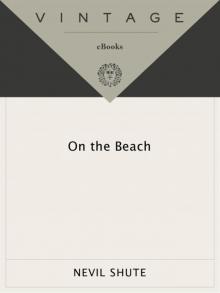 On the Beach
On the Beach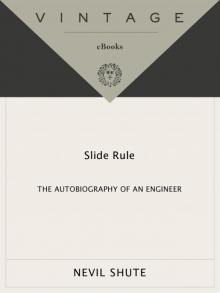 Slide Rule
Slide Rule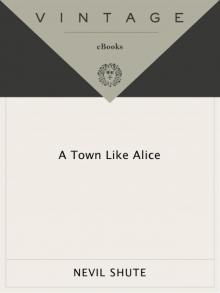 A Town Like Alice
A Town Like Alice The Far Country
The Far Country Pied Piper
Pied Piper Round the Bend
Round the Bend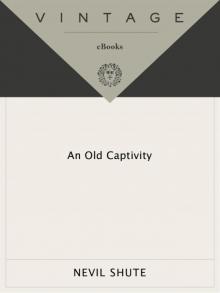 An Old Captivity
An Old Captivity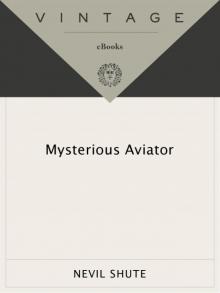 Mysterious Aviator
Mysterious Aviator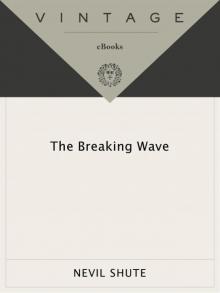 The Breaking Wave
The Breaking Wave Marazan
Marazan Lonely Road
Lonely Road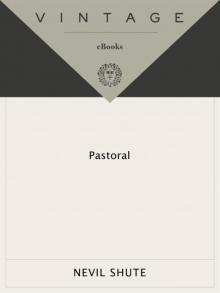 Pastoral
Pastoral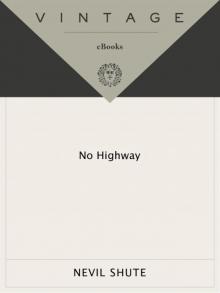 No Highway
No Highway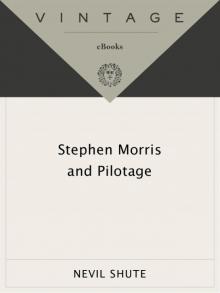 Stephen Morris and Pilotage
Stephen Morris and Pilotage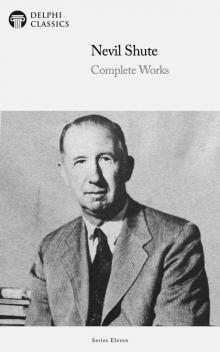 Complete Works of Nevil Shute
Complete Works of Nevil Shute Most Secret
Most Secret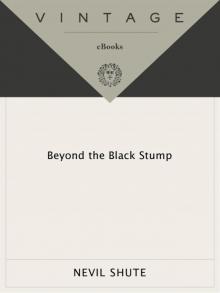 Beyond the Black Stump
Beyond the Black Stump The Rainbow and the Rose
The Rainbow and the Rose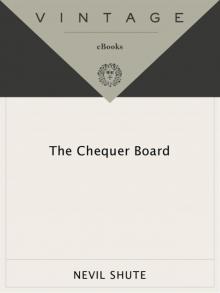 The Chequer Board
The Chequer Board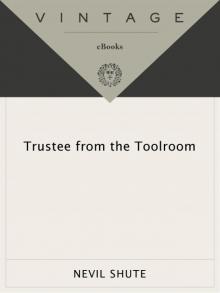 Trustee From the Toolroom
Trustee From the Toolroom Ordeal
Ordeal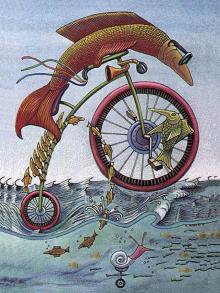 Stephen Morris
Stephen Morris